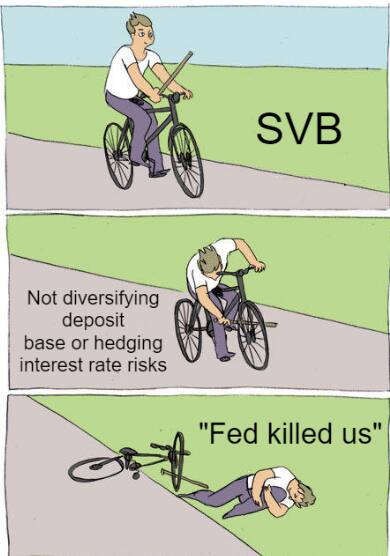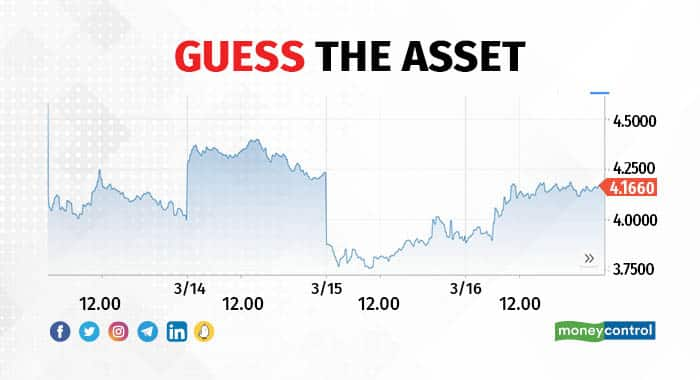



There are years when nothing happens, and then there are weeks when everything, everywhere all at once starts to crumble. It's just been one such week for the financial world.
A high-flying bank collapsed in a matter of hours. Its avant-garde clientele, which was on a mission to disrupt multiple industries, practically disrupted itself. Other financial institutions appeared to be perched on eggshells. Regulators bared their fangs, and then laid out a safety net.
While the entire world was transfixed by the escapades in the US, a European titan swooned. Its Saudi Arabian benefactor balked. A Swiss knight in a shining armour swooped in. The markets lurched lower, but immediately went on a tear.
If you had submitted this manuscript to a publisher, it would have been rejected for being too outlandish. Which is why reality is the most widespread fiction. Because it does not have to make any sense. But we can always try.
Silicon Valley Bank: Too much virtue is a vice

On March 10, America’s 16th largest bank collapsed.
With over $200 billion in assets, Silicon Valley Bank was the second-largest bank failure in US history (after that of Washington Mutual in 2008).
Silicon Valley Bank took the first two words in its name very seriously. It was the banking partner for around half of US venture capital-backed tech and life sciences startups, and a key hub of the private equity industry.
It was one of the biggest beneficiaries of the post-Covid funding boom in the startup space. In January 2020, SVB had $55 billion in deposits, which swelled to $186 billion by the end of 2022.
New-age companies, flush with funds from frothy IPOs and SPAC deals, shoveled money into SVB, which in turn parked these funds in long-term government bonds and mortgage-backed securities.
When interest rates were zero or thereabouts, it seemed to be the most profitable trade ever. But once the Federal Reserve started hiking rates to tame inflation, all those elaborate business plans centered around avocado toast deliveries or dog grooming morphed into cash-guzzling liabilities.
As funding dried up, SVB’s startup clients began yanking away their deposits, gradually at first and then at a furious pace. They tried to withdraw a whopping $42 billion in one day, forcing SVB to liquidate its bonds at a loss and try to raise funds via share sale to meet the shortfall, which made its clients even more nervous.
SVB’s biggest strength – its large roster of startup clients – morphed into its biggest weakness as the hyperkinetic, always-online tech bros and VCs goaded each other to grab their bank deposits, accelerating the bank’s demise.
In fact, we may have just seen the first Twitter-triggered bank run.
For years the messiahs of no-holds-barred, winner-takes-all capitalism, these VCs conducted a high-pitched online campaign beseeching FDIC, Federal Reserve and the Treasury Department to come to SVB’s rescue.
“This is an *extinction level event* for startups and will set startups and innovation back by 10 years or more,” Y Combinator CEO Garry Tan tweeted.
Capitalism when you make profits, socialism to cover the losses. Great innovation, right?
As to why SVB was running in autopilot mode is a question financial historians will ask for a long time. The bank failed to hedge its interest rate risks despite everyone in the financial world knowing that the Fed will tighten monetary policy. Astonishingly, SVB was without a chief risk officer for 8 months last year.
The top management also offloaded SVB stocks worth over $4 million over the previous two weeks – something the regulators are looking into.

SVB’s implosion also serves up a vital lesson for all of us – the dangers of over-concentration. If we don’t diversify our source of income as well as investment baskets, we are just one freak step away from catastrophe.
SVB unravelled shortly after crypto-focussed lender Silvergate Capital had collapsed.
Then on March 12 (Sunday), New York state regulators shut down Signature Bank, another big lender in the crypto industry, with over $100 billion in total assets and $88 billion in deposits.
Boom.
The 2nd and 3rd largest bank failures in US history happened within days of each other, sending alarm bells ringing and forcing regulators to rush in.
The Treasury Department, Fed and FDIC issued a joint statement on Sunday evening, assuring SVB depositors that they will have access to all of their money starting Monday, March 13.
“We are also announcing a similar systemic risk exception for Signature Bank, New York, New York, which was closed today by its state chartering authority. All depositors of this institution will be made whole. As with the resolution of Silicon Valley Bank, no losses will be borne by the taxpayer,” the statement said.
The FDIC, which insures up to $250,000 per account, made an exception to the rule and is paying back the depositors of both the bank in full to shore up confidence in the banking system.
But doesn’t it raise a moral hazard for bank managements, who can now count on the federal government to rescue the lenders any time their risky bets go awry?
Before investors could ponder on this question, another volcano erupted.

Shares of Credit Suisse, the enfant terrible of the global financial world, plunged as much as 30 percent after its annual report revealed "material weaknesses" in controls over financial reporting.
Switzerland’s second-biggest bank also said it had not succeeded in containing customer outflows.
Compounding its troubles, Credit Suisse’s largest shareholder, the Saudi National Bank, threw up its hands, saying it could not provide further support.
However, the Swiss National Bank stepped in, and announced a credit line of up to 50 billion Swiss francs ($54 billion).
Here’s where the math gets really spicy.
Credit Suisse, with a market cap of around $8 billion, is being lent up to $54 billion by an entity which posted a loss of $143 billion in 2022.
The next time your loan application is rejected, march into the office of the bank manager and confront him/her with the above figures. You’ll be thrown out, no doubt, but at least you would’ve made your point.
Speaking of investors making their point, can you guess which asset this is solely based on this chart?

This is not some meme stock, shady crypto or NFT. This is the US 2-year Treasury, which posted its biggest one-day fall since October 20, 1987 (a day after “Black Monday”), as investors whiplashed by the global banking turmoil rushed to the safety of government bonds.
The yields recovered as the week progressed, as did the markets (in fits and starts), but not before another US lender -- First Republic Bank – had to be salvaged by large US banks with a $30-billion rescue package.
Will the troubles never end?
The regulators have repeatedly assured everyone that everything was fine.
There’s no reason to disbelieve them, right? But who knows what next week will bring.
A week may be a long time in politics, but as the previous sessions have shown, it is an eternity in the world of finance.
Discover the latest Business News, Sensex, and Nifty updates. Obtain Personal Finance insights, tax queries, and expert opinions on Moneycontrol or download the Moneycontrol App to stay updated!
Find the best of Al News in one place, specially curated for you every weekend.
Stay on top of the latest tech trends and biggest startup news.